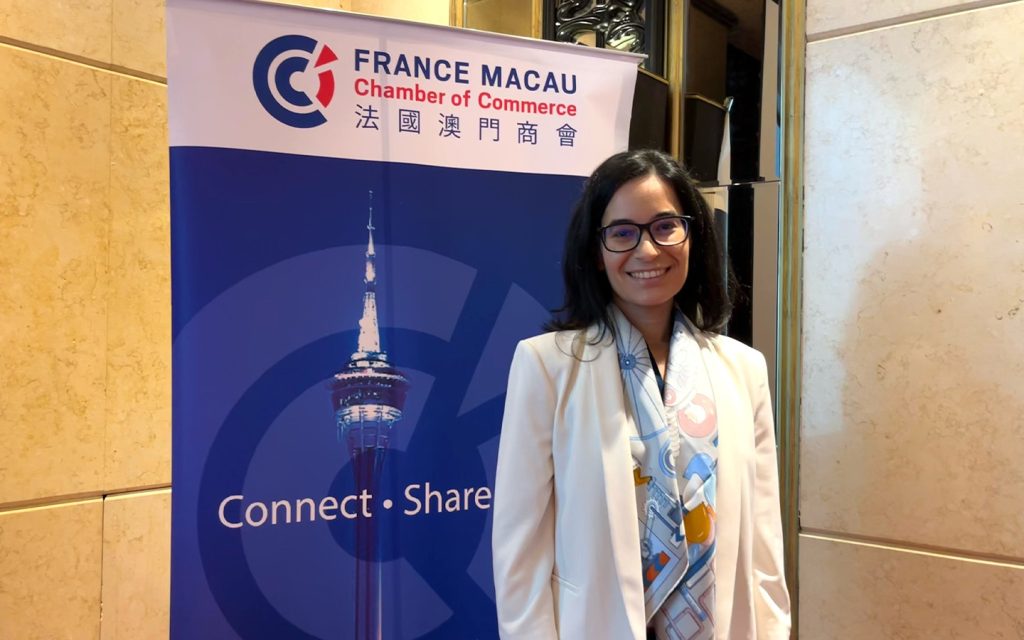The dramatic growth of artificial intelligence (AI) has seen many businesses attempt to capitalise on the technology’s ability to create free, high-quality images with only a few prompts – and in a matter of seconds.
However, while AI image generators are useful tools for commercial purposes, there are various legal and copyright issues that must be taken into consideration, said Célia F. Matias, an assistant professor of global legal studies at the University of Macau. She was delivering a presentation entitled “AI Art for Business: Legal Issues” at the France Macau Chamber of Commerce (FMCC)’s monthly breakfast talk, which was held this morning at the Sofitel.
During her speech, Matias noted that AI-generated art can be divided into those that are generated for exhibition and those that are created by everyday people using publicly available generators.
She gave various examples of the former, with some of the most notable instances being artist Harold Cohen’s AARON software in the 1970s – one of the earliest AI image generators, and – AI-designed “African” masks that were displayed at the Macao Cultural Centre recently.
On the topic of whether or not AI generated images can be considered an individual’s intellectual creation, the professor pointed out that “we have different answers depending on where you look.”
For instance, Matias cited the example of the artist Kris Kashtonova, who relied entirely on AI to create the images in her comic book Zarya of the Dawn. When the US Copyright Office found out about it, they removed the copyright of each picture, as “AI output in itself is not copyrightable.”
On the flipside, the expert mentioned a Beijing court ruling that AI images could be considered intellectual property because “all the repeated prompts, all the specifications or the selection and reselection [of parameters] amounted to a relevant intellectual investment.”
[See more: AI is transforming tourism, but experts say there are ethical considerations]

Apart from intellectual ownership of such images, the UM professor also discussed the problem concerning the use of copyrighted material to train AI image systems. Again, she pointed out that the regulations can vary from country to country. According to Matias, a US court was of the opinion that “AI training is something more than just the copy,” in an ongoing case involving the AI image generator platform, Stability AI, which has been accused by various comic artists of illegally copying their work.
Meanwhile, the EU has taken steps to address the issue, with the expert noting that there has been a text and data mining exception put in place since 2019 that allows for such activities to take place for commercial purposes, although she notes that “authors have an opt-out right.” In contrast, Japan and Singapore permit text and data data to be fed into AI systems “for non-commercial and commercial purposes without the opt-out right.”
In the case of mainland China, Mattias points out that there is no indication as to how the country intends to deal with the use of copyrighted material for AI training, although she noted that she has heard from some people that “it will be a pro AI solution.”
The question of whether or not the prompts used to generate computer-generated pictures are copyrighted was also broached, with the expert stating that such prompts could be looked at in the same way as computer codes, which are copyrighted as literary works. However, she pointed out that copyright may not be very useful in this jurisdiction given the “randomness between the prompts and outputs”
As for Macao, Mattias said that she “doesn’t see any major issues with the copyright law” in the city, although she does believe issues concerning computational analysis and text and data mining need to be discussed, “otherwise, our law will be very anti AI.”
AI has been a popular FMCC breakfast talk topic, with previous presentations focusing on AI systems such as ChatGPT, as well as their implications in areas including tourism, translation and the experience economy.
The next FMCC breakfast talk is scheduled to take place on 24 April.






